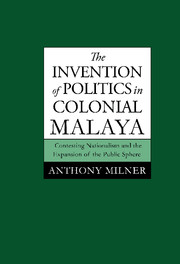 The Invention of Politics in Colonial Malaya
The Invention of Politics in Colonial Malaya Book contents
- Frontmatter
- Contents
- Preface
- Map of Malaya
- Introduction: Colonialism, Nationalism and Contest
- 1 The Ancien Régime: Described and Condemned
- 2 Establishing a Liberal Critique
- 3 A Description of the Real World: Expanding Vocabularies
- 4 Conceptualizing a Bangsa Community: A Newspaper of Moderate Opinions
- 5 Building a Bourgeois Public Sphere
- 6 Ideological Challenge on a Second Front: The Kerajaan in Contest with Islam
- 7 Answering Liberalism: Islamic First Moves
- 8 Kerajaan Self-reform: Chronicling a New Sultanate
- 9 Practising Politics in the Mid-Colonial Period
- 10 Surveying the Homeland: Sedar and Dialogic Processes
- Conclusion: The Malay Political Heritage
- Select Bibliography
- Index
8 - Kerajaan Self-reform: Chronicling a New Sultanate
Published online by Cambridge University Press: 18 December 2009
- Frontmatter
- Contents
- Preface
- Map of Malaya
- Introduction: Colonialism, Nationalism and Contest
- 1 The Ancien Régime: Described and Condemned
- 2 Establishing a Liberal Critique
- 3 A Description of the Real World: Expanding Vocabularies
- 4 Conceptualizing a Bangsa Community: A Newspaper of Moderate Opinions
- 5 Building a Bourgeois Public Sphere
- 6 Ideological Challenge on a Second Front: The Kerajaan in Contest with Islam
- 7 Answering Liberalism: Islamic First Moves
- 8 Kerajaan Self-reform: Chronicling a New Sultanate
- 9 Practising Politics in the Mid-Colonial Period
- 10 Surveying the Homeland: Sedar and Dialogic Processes
- Conclusion: The Malay Political Heritage
- Select Bibliography
- Index
Summary
At the opening of the twentieth century only certain members of the kerajaan elite retreated from the challenges of modernity. Others saw genuine opportunities arising from the political and economic consequences of British colonialism. In the state of Johore, for instance, there occurred a relatively well-documented attempt to respond in a creative manner both to the British Raj and to the type of liberal doctrines about politics and the state which were being expanded in the newspaper, Utusan Melayu. A royal ideologue from Johore, Haji Mohd. Said bin Haji Sulaiman, wrote a narrative account of his sultanate which displays ingenuity in grappling with essentially hostile ideas. By accommodating and even reformulating certain elements of a rival philosophy, this author helped the immediate fortunes of the Johore dynasty. The long-term consequences, however, may have been very different.
Haji Mohd. Said, who was the personal secretary of the Johore Sultan, wrote his study at about the same time as the Utusan and Al Imam were being published. It was first printed in 1908 and republished in 1911, 1919 and 1930. A clear indication of the contents of this work is suggested by the title, the Hikayat johor dan Tawarikh al-Marhum Sultan Abu Bakar (The Account of Johore and the History of the Late Sultan Abu Bakar). In the manner of much earlier kerajaan literature, the hikayat focuses on the state's ruling family. In other ways too it is reminiscent of traditional writing. It has a strongly panegyrical tone, often uses the established language of court literature and tends to be preoccupied with ceremonial matters. Despite these features, however, the Hikayatjohor is innovatory in highly significant ways.
- Type
- Chapter
- Information
- The Invention of Politics in Colonial MalayaContesting Nationalism and the Expansion of the Public Sphere, pp. 193 - 225Publisher: Cambridge University PressPrint publication year: 1995
